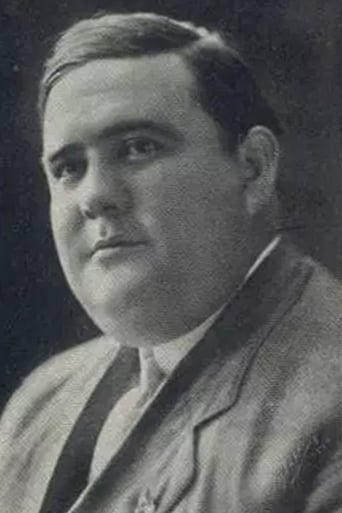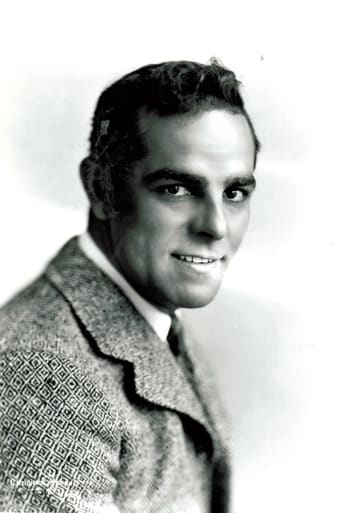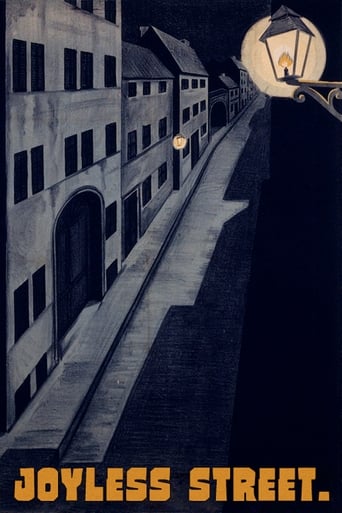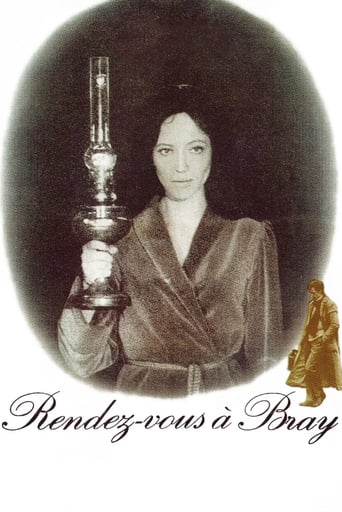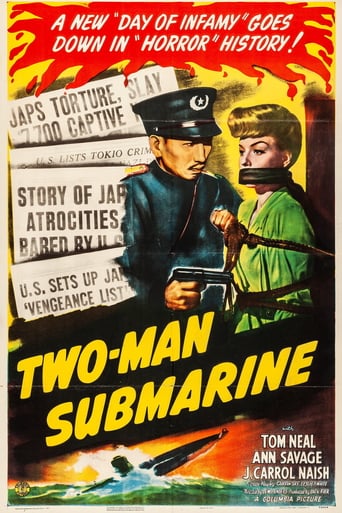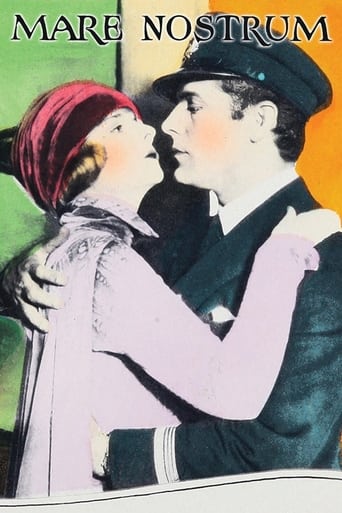

Mare Nostrum (1926)
The story of a female German spy who willingly sacrifices her life for her country.
Watch Trailer
Cast
Similar titles

Reviews
A Masterpiece!
There are better movies of two hours length. I loved the actress'performance.
The acting in this movie is really good.
The movie really just wants to entertain people.
A decent enough film, but it's unlikely to blow you away. Set during WWI, a Spanish sea captain (Antonio Moreno) traveling in Italy meets and falls in love with a young German woman (Alice Terry). One problem is that he's married, and has a young son. Another is that the German woman and her older colleague (Mademoiselle Paquerette) are both spies, and convince him to help the Germany navy out in a way whose ramifications he can't fully appreciate. The film is thus about guilt and paying for the choices one makes in life, and director Rex Ingram pulls no punches. I loved the scenes on location in Naples, Pompeii (with Vesuvius smoking the background), Marseilles, and Barcelona. The scenes with U-boat attacks were tense, and the German officers suitably sinister. It's a little on the melodramatic side, and there are some rather big coincidences to help the plot get to where it's going. Even at 102 minutes, the film is belabored, and elements like the prologue could have been cut. There's something missing to truly recommend it, but on the other hand, it's well made and reasonably entertaining 92 years later.
The movie focuses on the life of a man who sails the Mediterranean Sea. As a child Ulysses Ferragut (Antonio Moreno), a Spaniard, had a passion for the sea. His uncle, the Triton (Uni Apollon), instilled in him sea tales and stories of the pagan goddess Amphitrite, a protector of sailors. He kept a supposed picture of her on the wall. Against the wishes of his father Don Esteban, who wants him to become a lawyer, Ulysses grows up to become a sea captain of his own fast freighter, the "Mare Nostrum." As he spends so much time at sea (and without much profit) he is rarely with his wife Cinta and young son Esteban. After World War I begins (1914), Ulysses' merchant business becomes very rewarding. After his ship moors at Naples in still-neutral Italy, Ulysses takes a vacation, visiting the old Roman ruins at Pompeii, destroyed long before by the eruption of Mt. Vesuvius (79 AD). It still smolders. At the site Ulysses meets enthralling Freya Talberg (Alice Terry), who soon tells him point blank that she is a spy for her native Austria (Austro-Hungarian Empire), the main ally of Germany. Her traveling companion is mannish, heavy-set Dr. Fedelmann (Mademoiselle Paquerette). Declaring that he is a neutral Spaniard and not directly involved with the war, Ulysses is smitten with Freya. He notes that her likeness is the same as that of Amphitrite. Ignoring his small family, Ulysses begins a long affair with Freya.Meanwhile, the concern of the German spies – Fedelmann and Count Kaledine – who have set up headquarters in Naples, is that the Italians are contemplating joining the allies in the war (English, French, and Russians) against the Central Powers (Germans, Austrians, and Hungarians). After Italy does indeed declare war against Austria (1915), Fedelmann and Kaledine leave Italy to set up shop in neutral Spain (Barcelona).Encouraged by Freya to help Germany, Ulysses provides fuel for a German submarine operating in the Mediterranean. He is promised that the subs will torpedo only military vessels, not passenger ships. Under an odd-looking German commander, the sub later torpedoes an English passenger vessel that is carrying his son, Esteban, killing him. Mournful Ferragut decides to pursue those responsible for his only son's death. Subsequent scenes of note are the long crowd chase of a German spy in Marseilles, the firing squad scenario, and the final underwater setting.Filmed on location in several countries, Rex Ingram's movie was probably his most ambitious enterprise outside of "The Four Horsemen of the Apocalypse." The predictable, melodramatic spy-story really is not too thrilling, but good visuals/photography and on-location filming in France, Italy, and Spain help. See those large ships in Naples harbor; never mind the sea-models. Uni Apollon certainly reminds one of an old sea-dog. Alice Terry is alluring while Antonio Moreno is handsome. Grotesquely untidy and obese Hughie Mack is the jolly Spanish servant, Caragol. One wants to cry out to him: "Caragol, take a bath, and please, burn those clothes!" In the end he does find himself immersed.The source of the phrase, "Mare Nostrum" originates solely from the Roman Empire. This huge dominion, the most far-flung and durable of antiquity, encompassed the entire Mediterranean Sea. As the Romans controlled the Mediterranean basin for hundreds of years, they fittingly called the vast water-system "Our Sea" (Mare Nostrum). Not only was the sea a link for many nations of the empire, but it also helped Rome to ship troops to faraway trouble spots.
Ulysses (handsome Antonio Moreno) owns a boat called the Mare Nostrum. He also has an uncaring wife but a son Estaban (Mickey Brantford) whom he loves. An evil, sexy German spy Freye (Alice Terry) seduces Ulysses and convinces him to help bring supplies to a German sub. He does and the sub ends up destroying a ship that Estaban is on. Ulysses vows to kill all the people responsible.This silent film was believed lost for many years. Thankfully it's been found and beautifully restored. Basically, this is a tragedy so it's hardly a happy film but still it's extremely well-made and directed by Rex Ingram, one of the best silent film directors. There are some very amusing miniature ships and subs in some sequences, but this WAS 1926--that's probably the best they had! The acting is good too. Moreno was a very popular star in his day--sadly, he's forgotten today. He's good-looking and gives one hell of a performance--some of his reaction shots were incredibly good. Terry was obviously hired because she was married to director Ingram, but she was a good actress and she's good here. She was cast against type playing an evil woman (she usually played the good girl) and she pulls it off. Her scene in front of the firing squad is just great. And young Brantford is very good as Estaban. The only bad thing was Caragol (Hughie Mack)--an obese man who provides unfunny comic relief. And it DOES have a silly ending.Still, a great silent film. Well worth catching.
About ten minutes into this plush production comes a jaw-dropping scene of visual fantasy--a vision of the maritime goddess Amphitrite--which is matched by a similarly striking underwater sequence at the end. Unfortunately, between these bookends sits a Victorian melodrama of adultery/guilt/expiation, which is then shoe-horned into a WWI spy plot: betrayal of spouse reflected in betrayal of country.Despite its mythological and religious trappings, this is deeply conventional story-telling: while an artist examines the ambiguities of behavior, director Rex Ingram is satisfied with this formula plot, leaving his actors no credible characters to develop and only pot-boiler dialogue to mouth ["You are the only man I ever loved!"]. So, although Antonio Moreno looks fit in his sailing captain's uniform, he mostly frowns in pain or puzzlement, while the excellent Alice Terry must enact everything from villainy to martyrdom with little help. The other players are earnest, some used for heavy-handed stabs at humor; however, this film's disregard for people becomes clear as--late into the film--new, throw-away characters keep appearing to deliver more exposition.The action sequences--impressively shot on locations in Barcelona, Marseilles and Naples--include a mob chasing a German spy around a harbor, plus several submarine attacks and shipwrecks [done with entertainingly elaborate though unconvincing miniatures]. Yet even the visuals seem conventional and static, like academic paintings, especially when compared to the cinematic dynamism of Sternberg or Walsh.The title refers to the Mediterranean Sea, but is also the name of the hero's ship, and acquires still a third meaning at the end.
